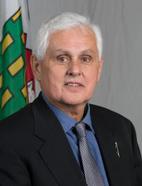Thank you, Madam Chair. I don't have any notes. Well, I've got a few little notes here I jotted down, but I guess, when I look at the mandate and, like I said earlier today, as I look at where we are fiscally, we are in a tough position; but, again, this is a new government, new ideas, new hope to make the NWT, I guess I could say "great again," but we're already great, so better with what we have.
My focus, I guess, is going to be on the economy and business. I think, with the 19 Members that we have here, we've pretty well got all the issues covered off. There is interest in every area, and that's what I'm going to count on. I'm going to count on people who have a stronger interest or more knowledge than I have in certain areas to help me make the right decisions; but, when it comes to business and the economy, I'm glad that we have diversification in there. It's going to be a real positive impact on the region and smaller communities, but it's important also that this government takes a look at collaboration between departments, because I think that's been lacking in the past, like with housing and different projects. If the departments work together, there are only 45,000 of us here, there's no reason why we shouldn't all be working, just looking after ourselves, basically.
Having a strong economy, as well, you know, there is some despair out there; there are people losing hope, and it's up to us to at least give them tools to give them that hope back and make it stronger. So I guess, for me, it's all about the people. At the end of the day, I'll do what I can in this House, but, as an MLA, there are people who call me and text me and email me with their issues, and those are important. It's important to them, and it's important to me. Usually, they want you to deal with it right away, and most times you can see why they want you to deal with it right away.
One of the things I find with this government, when I look at some of those coming in and I think it's something this government should look at, is we're sending emails on to you to look at and deal with issues that should be routine and that should be able to be dealt with in your departments, in the communities and in the regions, yet we're taking time away from, you know, you should be doing bigger things, and we should be able to deal with the community issues, but we have to be able to somehow find a way where we can work with the departments and the regions; as an example, the Hay River Health Authority. You know, I guess maybe I'm supposed to be bringing any issues up to the Minister here, but my sense and the way I've always operated is just go to the source, make a decision, deal with it, and get it done, and people are happy.
So I think everything has been said by everybody here already, and I just want to get down and get to work. We have to roll something out to the communities and to the territories, and, if we don't do that, if we just sit here for another two months and they still haven't got anything, you know, we might as well just pack it up and let somebody else take our places. It's that easy. So I look forward to working with everybody, and there is still, I think, maybe one Minister who is giving hugs, I think Paulie; I'm not sure if anybody else is, but that's good. We're still getting along. Thank you, Madam Chair.
